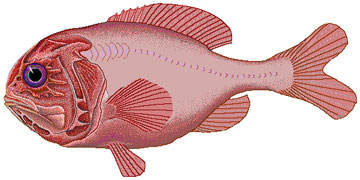Deep sea fish growing slower due to global warming
Deep sea fish growing slower due to global warming
Rhett A. Butler, mongabay.com
April 23, 2007
Changes in ocean temperature have altered the growth rates of commercially harvested fish over the past century, according to a new study published in this week’s early online edition of the Proceedings of the National Academy of Sciences (PNAS).
Analyzing the ear bones of 555 commercially caught fish to determine age, the researchers, led by Ronald E. Thresher of CSIRO-Australia, report that warmer temperatures in the southwest Pacific Ocean have enabled shallow-water fish to grow faster, perhaps making them more resilient to commercial exploitation. At the same time, deepwater regions have cooled, reducing the growth rates of fish species found at depths greater than 1000 meters (3300 feet), by 30 percent relative to 50 years ago.

Orange roughy (Hoplostethus atlanticus). Drawing by former FishBase artist Robbie Cada. |
While the results have potential implications for commercial ocean fisheries, the researchers say the trend might be temporary.
“With increasing global warning, temperatures at intermediate depths are likely to rise near globally… suggesting that… the decrease in growth rates for the deep-water species could slow and even be reversed.”
Deepwater fish tend to be longer-lived than shallow water dwellers–some species, like the warty oreo (Allocyttus verrucosus) and orange roughy (Hoplostethus atlanticus), may live to be more than 130 years old. Their slow reproductive rate means they are especially vulnerable to overexploitation and conservation groups have recently warned that a number of deepwater fish stocks are at the point of collapse.
Related
Overfishing of sharks causing shellfish decline. Overfishing of large sharks is reducing the abundance of shellfish reports a study published in the March 30 issue of the journal Science. A team of Canadian and American biologists has found that population declines in large predatory shark species — including bull, great white, dusky, and hammerhead sharks — due to overfishing has led to a boom in their ray, skate, and small shark prey species along the Atlantic Coast of the United States. Now these smaller species are depleting commercially important shellfish.
Global warming, cod collapse cause changes in Atlantic ecosystem. North Atlantic ecosystems are undergoing rapid change due to overfishing and global warming reports a Cornell University oceanographer in the February 23 issue of the journal Science. Charles Greene, director of the Ocean Resources and Ecosystems Program in Cornell's Department of Earth and Atmospheric Sciences, says that while other scientists have argued that ecosystem change is the result of the population crash of cod, be has found evidence that climate change is playing a significant role in the region.
Government subsidies drive deep-sea fish depletion. Saturday an international team of economists and scientists called for a ban on government subsidies that drive deep-sea trawling. Biologists say the practice is destroying the world's fisheries.
10 commandments that could save world fisheries. Global fisheries are in decline. Now a team of scientists have proposed a set of ten commandments to protect the world's marine fish populations while ensuring ongoing production of sea food in a sustainable manner. They presented their work Sunday at the annual meeting of the American Association for the Advancement of Science in San Francisco.
Global warming may be beneficial to some fishermen. Climate change may be a boon to fisheries off northwestern Africa according to research published in Friday's issue of the journal Science. Lead by Dr. Helen McGregor, a paleoclimatologist at the University of Bremen's Research Center Ocean Margins in Germany, a team of scientists using data from sediment cores linked coastal upwelling off the coast of Morocco to 20th century climate warming. The results are significant because coastal upwelling zones, where nutrient-rich waters rise to the ocean's surface, yield roughly 20 percent of the world's fish harvest but represent less than one percent of the world ocean surface area.